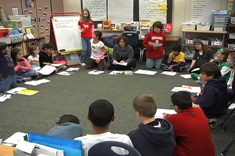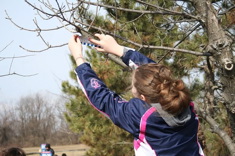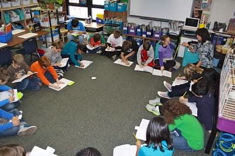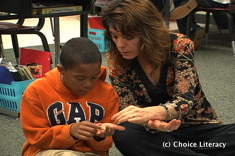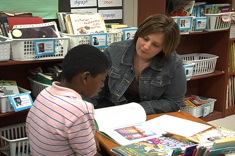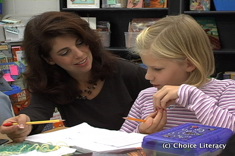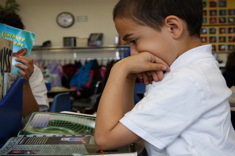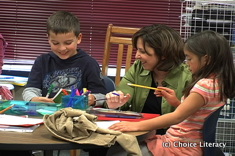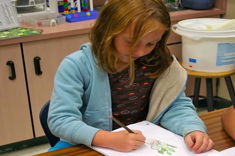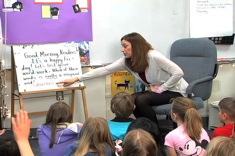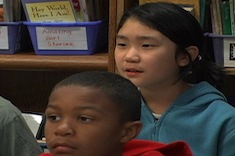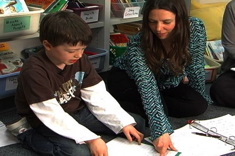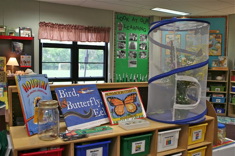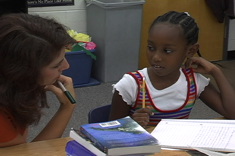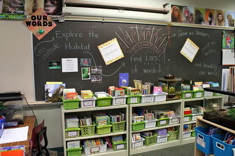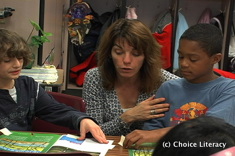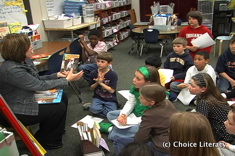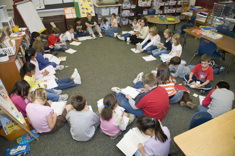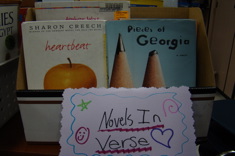3rd
Latest Content
Book Matchmaker: Short Vowel Practice with Older Students
In this installment of Book Matchmaker, Franki Sibberson tackles the tough question of how to find texts for students who need help with short vowels, but are too old to enjoy many primary texts.
Read Alouds for the Last Days of School
Choice Literacy readers share some of their favorite read alouds for the last days of school.
Injecting Writing into Everything: Bringing the Outside In
Heather Rader helps a 3rd grade teacher break through the resistance of some student writers. The magic tool? A dirty onion from the garden.
Literacy Keepsakes to Carry Home at the End of the School Year
Choice Literacy readers share their favorite gifts for students to make and take home at the end of the year.
More Literacy Keepsakes to Carry Home at the End of the School Year
Choice Literacy readers share more of their favorite end-of-year gifts for students to make and take home.
Beginning with the End in Mind: Planning Ahead for Closing Activities
Choice Literacy readers share their favorite end-of-year activities that circle back to events from the start of the school year.
The Power of Wonder Questions
Andrea Smith writes about how she uses wonder questions in her science curiculum.
Using Student Conferences to Build Book Choice Skills
Franki Sibberson provides focus questions and a template to help choose books with students for independent reading.
New Notebook Essentials
We’ve all had the experience of reading a professional book and disagreeing with some of the ideas from the author. It’s just a little more surreal when you wrote the book! Aimee Buckner participates in her school’s study group reading of Notebook Know-How, and finds some of her thinking about notebooks has changed over the past few years.
Quick Take: Selecting Mentor Texts for Writing Instruction
In this two-minute video, Aimee Buckner explains how she selects mentor texts for writing, as well as the importance of using writing by students and teachers in lessons.
Rethinking the Study of Nonfiction in the 21st Century
Franki Sibberson reflects on her nonfiction writing unit, and realizes she emphasizes research skills at the expense of the craft of nonfiction writing. She explains how she revamps the unit to help students focus more on writer's craft in nonfiction texts, including some new mentor texts and different ways of using writer's notebooks.
Using Picture Books to Teach Theme in Grades 3-6
Many students in the upper elementary and middle school grades shun all picture books, yet they are an invaluable resource for teaching sophisticated literacy concepts. Franki Sibberson explains how to teach the concept of theme using picture books in this booklist.
Infographics and Lists in Science Notebooks
Science notebooks are a wonderful tool for building outdoor observation and writing skills. Andrea Smith explains how writing in the notebooks leads students to explore different nonfiction text features like infographics and lists.
Punctuation Study with Third Graders
Mandy Robek finds a punctuation unit study with her third graders is a fun alternative to yet another genre study. Her essay includes booklists of children's literature and professional texts.
Understanding Students in Intervention Programs
Using data to make wise decisions about students who are struggling is one of the most important tasks in schools. In this series, Clare Landrigan and Tammy Mulligan take you through the process of linking data to instruction plans in intervention programs.
5th Grade Grandfather
Misunderstandings abound when working with struggling readers and writers. Jennifer Jones connects an experience in her personal life to one student she is supporting and gains new insight.
Mentor Texts for Urban Students
What texts work best for students with urban backgrounds? Shari Frost has suggestions for teachers.
Our Living Minute: Integrating Nonfiction Study into Morning Meetings
Teachers can accomplish plenty in a minute if they want to add more nonfiction to their day. Learn how from Andrea Smith.
Sarcasm Is a Useful Teaching Tool — NOT
How does sarcasm hurt students? Heather Rader counts the ways.
Getting and Giving Student Feedback
How can we help students be more reflective in our classrooms, giving us the feedback we need to make them better places for learning? Heather Rader has suggestions.
Our Daily Question: Building a Community Through the Data We Collect
If you’re looking for routines that meld community building and learning essential skills, you might enjoy Andrea Smith’s “Our Daily Question” activity with her 3rd and 4th grade students. Classmates share interests and build data gathering and analysis skills together.
When Do I Launch the Writer’s Notebook?
When and how should you launch writers' notebooks in your classroom? According to Aimee Bucker, it depends on if you are a "wader" or a "diver." She shares some of the ways she has slowly and quickly moved students into their notebooks in years past.
Living Words: Integrating Word Study, Technology, and Content Literacy (Part 1)
Living Words is a quick routine from Andrea Smith that helps students see the power of rich vocabulary for describing the natural world around them.
Writing Like a Scientist: Launching a Scientist’s Notebook
Andrea Smith explains how she launches a unit on science writing with logs, writing samples from scientists, and mentor texts.
Character Study in Grades 3-6
A character study unit is a terrific choice early in the school year, since it taps into students' reading histories and favorites from years past. Franki Sibberson has suggestions of books and questions for use in read-alouds.
Teaching Economics with Children’s Literature
Mandy Robek shares some of her favorite children’s books for teaching economics.
Books to Get Us Ready for Summer Vacation
Franki Sibberson finds preparing students for summer reading is a little different this year, now that she has moved from classroom teaching to work in the school library. Here are some terrific books to get students excited about summer.
Reflections on Our Year of Read Alouds (BOOKLIST)
if you're moving from thinking about read alouds for the first days of school, to plotting out a plan for read alouds all year long, you might want to read Franki Sibberson's booklist of read-alouds used for the entire year with her 3rd and 4th grade students.
Novels in Verse (BOOKLIST)
Franki Sibberson provides a booklist of "novels in verse" – a genre intermediate readers enjoy, especially those who struggle with longer texts.
Just Because It’s Skinny, Doesn’t Mean It’s Easy: Matching Books to Transitional Readers in Grades 2-4
Franki Sibberson writes about her evolution in choosing books for transitional readers in grades 2-4. Franki includes a handy list of criteria for evaluating whether new short chapter books are appropriate for young readers.
Browse Content By
Type
Category
- Assessment Tools
- Big Fresh Archives
- Booklists
- Choice Numeracy
- Classroom Design
- Common Core
- Community Building
- Conferring
- Content Literacy
- Digital Literacy
- English Language Learners
- Equity
- Family Relations
- Free Samples
- Guiding Groups
- Leadership
- Literacy Coaches
- Mentor Texts
- Minilessons
- New Teacher Mentors
- Podcasts
- Poetry
- Quote Collections
- Reading Strategies
- Self Care
- Struggling and Striving Learners
- Talking and Listening
- Teacher Study Groups
- Teaching Reading
- Teaching Writing
- Word Study and Vocabulary
Author
- Melissa Quimby
- Nawal Qarooni
- Gwen Blumberg
- Julie Cox
- The Lead Learners
- Hannah Tills
- Josie Stewart
- Ruth Metcalfe
- Mallory Messenger
- Becca Burk
- Jodie Bailey
- Vivian Chen
- Mary Brower
- Tiffany Abbott Fuller
- Stephanie Affinito
- Ruth Ayres
- Leigh Anne Eck
- Heather Fisher
- Shari Frost
- Julie Johnson
- Suzy Kaback
- Gigi McAllister
- Shirl McPhillips
- Melanie Meehan
- Cathy Mere
- Debbie Miller
- Tara Barnett and Kate Mills
- Tammy Mulligan
- Dana Murphy
- Bitsy Parks
- David Pittman
- Brenda Power
- Heather Rader
- Matt Renwick
- Mandy Robek
- Christy Rush-Levine
- Gretchen Schroeder
- Jen Schwanke
- Brian Sepe
- Katherine Sokolowski
- Stella Villalba
- Jennifer Vincent
Grade Level
Choice Literacy Membership
Articles
Get full access to all Choice Literacy article content
Videos
Get full access to all Choice Literacy video content
Courses
Access Choice Literacy course curriculum and training


